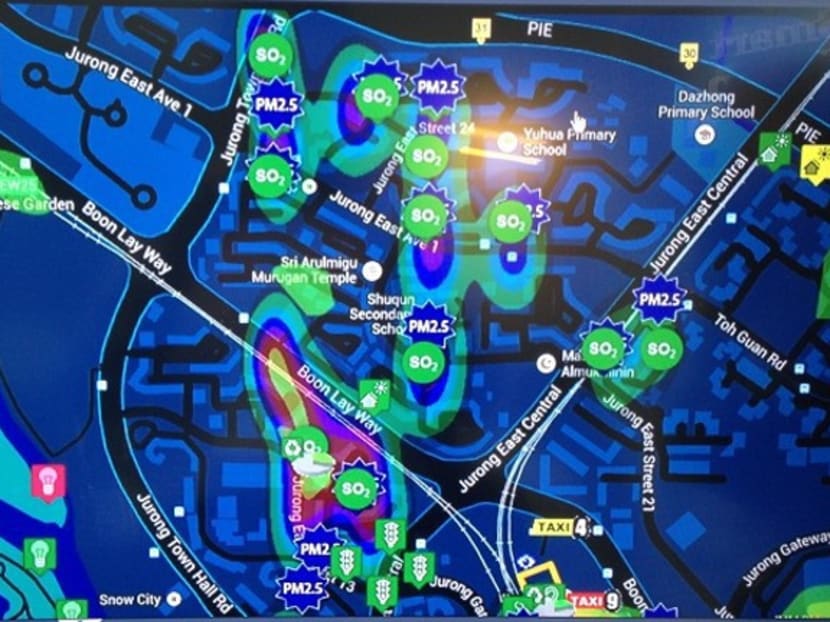Singapore unveils trials in push to become Smart Nation
SINGAPORE — Commuters sending data from their smartphones about their journeys while sensors pick up information about their transport choices to help plan routes. Advanced cameras catching people smoking in prohibited zones, optimising the deployment of enforcement personnel. Errant drivers are not spared, too, with video technologies detecting illegal parking.

This interactive screen featuring data collated from sensors in Jurong Lake District was shown at imbX 2014. Photo: Channel NewsAsia
SINGAPORE — Commuters sending data from their smartphones about their journeys while sensors pick up information about their transport choices to help plan routes. Advanced cameras catching people smoking in prohibited zones, optimising the deployment of enforcement personnel. Errant drivers are not spared, too, with video technologies detecting illegal parking.
Collecting and analysing data from such everyday situations may soon become a key driver in Singapore’s big push to become a Smart Nation, going by 15 projects — including the three highlighted above — that will go on trial in Jurong Lake District in the third quarter of this year.
Jurong Lake District will be a live test-bed as Singapore gears up to develop into a Smart Nation, tapping new technologies to develop sustainable solutions that improve the lives of people. More than 1,000 sensors and three above-ground boxes that provide access to fibre connectivity and power will be deployed to support the trials, which will last for a year.
Several government agencies, such as the Infocomm Development Authority (IDA), Land Transport Authority and National Environment Agency, will be working with more than 20 industry partners such as telco M1, ST Electronics and National University of Singapore to carry out the trials.
Speaking at the opening of the Infocomm Media Business Exchange 2014 yesterday, Dr Yaacob Ibrahim, Minister for Communications and Information, said: “As cities continue to grow, demands on urban infrastructure will also increase and resources will become scarcer. It is, therefore, imperative to develop smart communities that are driven by intelligence, integration and innovation.”
He pointed out two important trends that would drive a Smart Nation — big data, which would give insight into behaviour and preferences, and the Internet of Things, or web-connected everyday devices that make business processes more efficient and lives better. The Government is developing a Smart Nation Platform, which will include rolling out an operating system in which public agencies will be able to access, manage and share sensor data.
“Insights gained from this data would enable us to better anticipate citizens’ needs and help in better delivery of services,” said Dr Yaacob.
IDA assistant chief executive Khoong Hock Yun yesterday gave examples of ways in which services could be better delivered. These include tweaking the timing of traffic-light changes to manage traffic flow and allow pedestrians to cross roads safely, and putting sensors in trees to detect changes that may suggest they are at risk of being uprooted.
“These are some possibilities we are looking at to solve some of our national challenges,” he said.
The Government will also be starting the Internet of Things@Home Initiative, which will develop and trial solutions and standards for homes in collaboration with the Housing and Development Board. Areas of application include active ageing, home-based care and sustainable living.
The Smart Nation Platform will have a common infrastructure for sensor deployment. Mr Khoong said the next stage would involve 100 above-ground boxes in common outdoor areas, such as bus stops, parks and traffic junctions. Currently, M1 operates the three above-ground boxes.
Connectivity will be further extended through the use of so-called heterogeneous networks, which allow devices to switch between various types of wireless networks and improve the quality of connections. Trials for this technology are due to start next year.
While plenty of data will be involved in building a Smart Nation, user privacy is taken very seriously, Mr Khoong said, adding that the Government would refine rules and regulations in handling data internally.
Analysts say it is advantageous for the Government to move as a whole, instead of individual agencies working separately. Technology commentator Alfred Siew said: “It is good the IDA is laying out the base infrastructure for all agencies, which would lead to a faster and cheaper roll-out of sensors.
“At the same time, some of the agencies, for example, the police, may be worried that their sensitive data would be compromised if they share the same hardware or network. But that’s a fair question because the technology and standards for the sensor network are so new.”






